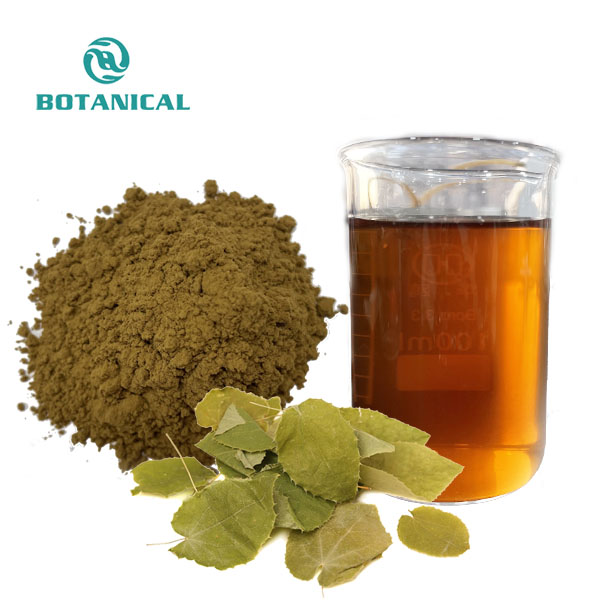Icariin is a naturally occurring compound that offers various therapeutic properties. Found primarily in plants from the Epimedium leaf, icariin has become a popular supplement due to its potential to enhance sexual health, exercise performance, and cognitive function. This article will explore the science behind icariin, top food sources, and how it may benefit your health.

Figure. Water-soluble epimedium extract powder
What is Icariin?
Icariin is a flavonoid glycoside and the vitally dynamic part found in horny goat weed (Epimedium spp.). It is referred to synthetically as prenyl icaritin or 3,7-dihydroxy-4′- methoxy-8-(3-methyl-2-butenyl)- flavone.
Icariin is considered a prenylated flavonoid, meaning it contains an extra isoprenoid bunch that permits it to all the more promptly enter cells and apply impacts in the body. This gives icariin novel pharmacological exercises contrasted with different flavonoids.
Potential benefits of icariin include:
– Aphrodisiac qualities
– Erectile dysfunction treatment
– Enhanced athletic performance
– Improved cognitive function
– Anti-inflammatory effects
– Increased testosterone levels
– Vasodilation and improved circulation
These effects are attributed to several mechanisms, including increasing nitric oxide production, reducing PDE5 activity, stimulating nerve growth factor synthesis, and regulating hormone levels. Let’s explore the top dietary sources of this intriguing compound.
Horny Goat Weed: The Primary Icariin Source
The Epimedium class comprises of a few dozen types of herbaceous blossoming plants local to China, Japan, and different pieces of Asia. Different species have a long history in conventional Chinese medication for dealing with conditions like exhaustion, joint pain, liver sickness, and feebleness.
Among the bioactive mixtures recognized in Epimedium separates, icariin is the most plentiful and pharmacologically strong. Icariin content varies significantly by species:
– E. sagittatum: 1.6-2.6% icariin
– E. brevicornu: 2.5-5% icariin
– E. koreanum: up to 15% icariin
Therefore, E. brevicornu and E. koreanum provide some of the most concentrated sources of icariin in nature. Standardized Epimedium extracts usually contain 10-60% icariin by weight.
Major food sources of Epimedium plants include:
– Raw leaves and stems: Traditionally used for tea or soup.
– Concentrated extracts: Available in capsules, tinctures, powders.
– Herbal blends: Combined with other herbs and superfoods.
When selecting an Epimedium supplement for icariin content, check for a standardized extract ratio and species with higher levels like E. koreanum.
Beyond Horny Goat Weed: Other Icariin Sources
While Epimedium species are by far the richest source, other plants contain trace amounts of icariin as well:
Rye (Secale cereale) – Rye pollen contains approximately 0.3-0.5% icariin. Only pollen, not cereal rye grains, provide icariin.
Grapevines (Vitis vinifera) – Vine stems and leaves contain icariin. Red grape skin also contains the related compound ampelopsin.
Jujube fruit (Ziziphus jujube) – Jujube, traditionally used in Chinese medicine, provides trace icariin content.
Passionflower (Passiflora spp.) – Certain species like P. incarnata may also contain very low levels.
However, since icariin content is marginal from these sources, Epimedium extracts remain the only viable dietary supplement option.
Top Foods High in Icariin
For those seeking to increase icariin intake, the foods highest in this compound include:
- Horny goat weed extract: Up to 60% icariin by weight.
- Raw Epimedium leaves: 1-5% icariin depending on species.
- Herbal formulas with Epimedium: Varies based on formula.
- Rye pollen extract: Up to 0.5% icariin.
- Grapevine extracts: Very low percentage from leaves and stems.
- Jujube fruit: Negligible trace amounts.
Given the high bioavailability and concentrations, standardized Epimedium extracts are by far the best dietary icariin source. For additional benefit, combining Epimedium with circulation-boosting foods like citrus, berries, leafy greens, and healthy fats can further enhance icariin’s effects.
Icariin, Nitric Oxide, and Vascular Function
One mechanism behind icariin’s therapeutic effects involves increasing nitric oxide (NO) production. Nitric oxide is a signaling molecule that relaxes blood vessels, increasing circulation and blood flow. This provides several benefits:
– Improves delivery of oxygen and nutrients to tissues
– Enhances physical performance and endurance
– Treats erectile dysfunction by supporting penile blood flow
– Lowers high blood pressure
Icariin appears to increase NO production through multiple pathways. This includes boosting expression of nitric oxide synthase (NOS) enzymes and preventing NO breakdown by inhibiting PDE5 enzymes.
Through enhanced NO-mediated vasodilation, icariin can improve various parameters related to cardiovascular health. More human trials are still needed to confirm ideal dosages and efficacy, however.
The Potential of Icariin Powder
Early research indicates icariin may have considerable therapeutic potential via several biological mechanisms:
– Increasing testosterone and regulating reproductive hormones
– Stimulating neurite growth and neuroprotective effects
– Suppressing inflammatory cytokines
– Exhibiting anticancer properties
– Protecting against oxidative neuronal damage
The antioxidant, anti-inflammatory, and cell-regulating activities of icariin likely contribute to this diverse range of benefits. However, most research remains preclinical at this time.
While regarded as safe, potential side effects of high-dose icariin supplementation can include dizziness, nausea, and minor gastrointestinal upset. Icariin may also interact with medications for erectile dysfunction and blood pressure.
Always consult your physician before beginning supplementation, particularly if being treated for a medical condition or taking prescription medications. Overall, icariin shows promise as a multifactorial nutrient for enhancing men’s health, cognition, endurance, and vitality.
Additional potential benefits
- Bone Health
– Invigorates osteoblast separation and bone arrangement
– Hinders bone resorption by osteoclasts
– Could assist with forestalling osteoporosis and age-related bone misfortune
- Brain Health
– Protects neurons and stimulates neurite growth through NGF
– Reduces beta amyloid plaques and tau proteins
– May support treatment of Alzheimer’s and dementia
- Immune Regulation
– Shows mitigating impacts by hindering NF-kB pathway
– May assist with dealing with provocative circumstances like rheumatoid joint inflammation
– Helps movement of normal executioner cells and macrophages
- Metabolic Health
– Improves insulin sensitivity and glucose metabolism
– Lowers cholesterol and triglyceride levels
– Could aid treatment of metabolic syndrome and diabetes
- Skin Health
– Activates collagen synthesis and inhibits MMP enzymes
– Helps repair UV damage and photoaging of skin
– Reduces appearance of wrinkles and improves elasticity
In most cases, positive effects required doses of at least 20-60 mg/kg body weight in animal models. Human studies are still needed to confirm benefits and ideal dosing. Icariin’s therapeutic mechanisms likely stem from its antioxidant potency and interactions with important biological pathways.
Developing Effective Icariin Supplementation Strategies
To maximize the benefits of icariin supplementation, some effective strategies include:
– Use standardized Epimedium extracts for optimal potency
– Take icariin powder doses between 100-200 mg daily
– Combine icariin with foods containing citrulline to increase nitric oxide levels
– Cycle icariin – 5 days on, 2 days off to avoid tolerance
– Take icariin supplements for 2-3 month periods for best results
– Pair icariin with gentle exercise for circulation and neuroprotective benefits
– Avoid taking icariin several hours before bedtime due to potential stimulation
Proper supplementation protocols can help optimize bioavailability while limiting side effects. Consulting a knowledgeable practitioner can also help tailor icariin intake and stacking for your individual health goals.
Future Outlook for Icariin Research
As research on icariin continues, some areas scientists are exploring include:
– Effects on reproductive cancers like prostate and ovarian cancer
– Benefits for cognitive disorders like dementia, ADHD and anxiety
– Applications for promoting longevity and healthy aging
– Treatment of inflammatory digestive disorders like IBS and Crohn’s
– Therapeutic effects on mitochondrial health and cellular energy
– Drug delivery methods to improve bioavailability
The diverse pharmacological activities of icariin guarantee its medicinal properties will continue to be uncovered in future studies. Realizing icariin’s full therapeutic potential could provide safe, natural alternatives for treating numerous health conditions.
In summary, icariin is a promising prenylated flavonoid compound with a diverse range of health benefits. Rich sources like Bulk Epimedium Extract 40% Icariin extracts offer convenient dietary supplementation. Proper dosing, cycling, and stacking can help maximize icariin’s biological effects. As research continues, unlocking icariin’s full therapeutic potential could provide natural alternatives to improve health and vitality.
Standardized Epimedium extracts remain the most concentrated and reliable source of icariin. These extracts can be obtained from professional suppliers such as Botanical Cube Inc., a reputable China Epimedium Extract 10% Icariin supplier. For more information or to place an order, please contact us at sales@botanicalcube.com.
References:
- Liu, W. J., Xin, Z. C., Xin, H., Yuan, Y. M., Tian, L., & Guo, Y. L. (2007). Effects of icariin on erectile function and expression of nitric oxide synthase isoforms in castrated rats. Asian journal of andrology, 9(6), 785.
- Ma, H., He, X., Yang, Y., Li, M., Hao, D., & Jia, Z. (2011). The genus Epimedium: an ethnopharmacological and phytochemical review. Journal of ethnopharmacology, 134(3), 519-541.
- Shindel, A. W., Xin, Z. C., Lin, G., Fandel, T. M., Huang, Y. C., Banie, L., … & Lue, T. F. (2010). Erectogenic and neurotrophic effects of icariin, a purified extract of horny goat weed (Epimedium spp.) in vitro and in vivo. The journal of sexual medicine, 7(4pt1), 1518-1528.
- Stanislavov, R., & Nikolova, V. (2003). Treatment of erectile dysfunction with pycnogenol and L-arginine. Journal of sexual and reproductive medicine, 1(3), 207-213.
- Xin, Z. C., Kim, E. K., Lin, C. S., Liu, W. J., Tian, L., Yuan, Y. M., … & Lue, T. F. (2003). Effects of icariin on cGMP-specific PDE5 and cAMP-specific PDE4 activities. Asian journal of andrology, 5(1), 15-18
- Zhang, Z. B., & Yang, Q. T. (2006). The testosterone mimetic properties of icariin. Asian journal of andrology, 8(5), 601-605.
- Zou, P., Xia, Y., Ji, Z., Chen, W., Ding, G., Yao, W., … & Wang, S. (2016). Icariin: a potential osteoinductive compound for bone tissue engineering. Tissue Engineering Part A, 22(19-20), 1148-1157.







